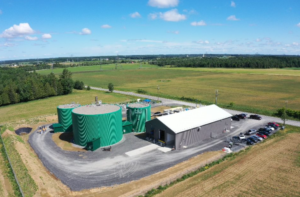

Last year, Natural Resources Canada launched a call for projects to address the lack of training available on clean fuels, in French among other languages.
In collaboration with Énergir and Coop Carbone, the Institut de technologie agroalimentaire du Québec (ITAQ) responded to the call for projects with a proposal for continuing education on agricultural biomethanization, which is the subject of this article.
This training offer is all the more relevant as the agricultural biomethanization sector, which was virtually non-existent just a few years ago, is experiencing vigorous growth in several regions of Quebec, as well as in Canada, the United States and Europe.
The training course is aimed at anyone who wants to know more about agricultural biomethanization, or who is involved in an agricultural biomethanization project, from near or far. This includes people working in agriculture, municipal or regional socio-economic development, post-secondary education, engineering, project financing, as well as environmental groups and NPOs involved in ecological transition. ITAQ and its project partners are convinced that the diversity of experience will add value to the group discussions that complete each module.
The aim of this ongoing training course is to demystify this new source of renewable energy – agricultural biomethanization – which is produced according to the principles of the circular economy and sustainable development. Participants in this four-module training program will be better equipped in the event of an agricultural biomethanization project being set up in their area, in which they are directly or indirectly involved.
Offered online in fall-winter 2023-2024 by ITAQ, this training consists of four modules in the form of webinars to be listened to individually, followed by a group discussion session with professional resources in agricultural biomethanization. With a total duration of 2-3 hours, each module is independent, but it is preferable to take the whole course as they are complementary. In addition, only participants who have completed all modules will be invited to visit the Coop Agri-Énergie Warwick site, which completes the training.
The modules are as follows
– Module 1: Biomethane in all its facets
– Module 2: Key elements of a biomethanization project
– Module 3: A case study: the Agri-Énergie Warwick cooperative
– Module 4: Social acceptability of the project and its integration into the community
Topics covered include financing and profitability, equipment requirements, regulations, market developments in Quebec and internationally, co-products such as digestate, and the conditions for successful integration into the farming environment.
In addition, each module is accompanied by short interviews with various partners in the field, in the form of capsules that can be viewed independently.
This training program is made possible thanks to funding from Resources Canada and Energir, as well as the Association québécoise de la production d’énergie renouvelable (AQPER) and Gazifère.
You can register now by visiting the ITAQ’s continuing education website: https://itaq-formationcontinue.omnivox.ca/cncr/insc/InfoActivite.ovx?NoActivite=E23_ASA2412&Cat=5&GrandeCat=1&Ref=112103396163&C=ITC&L=FRA